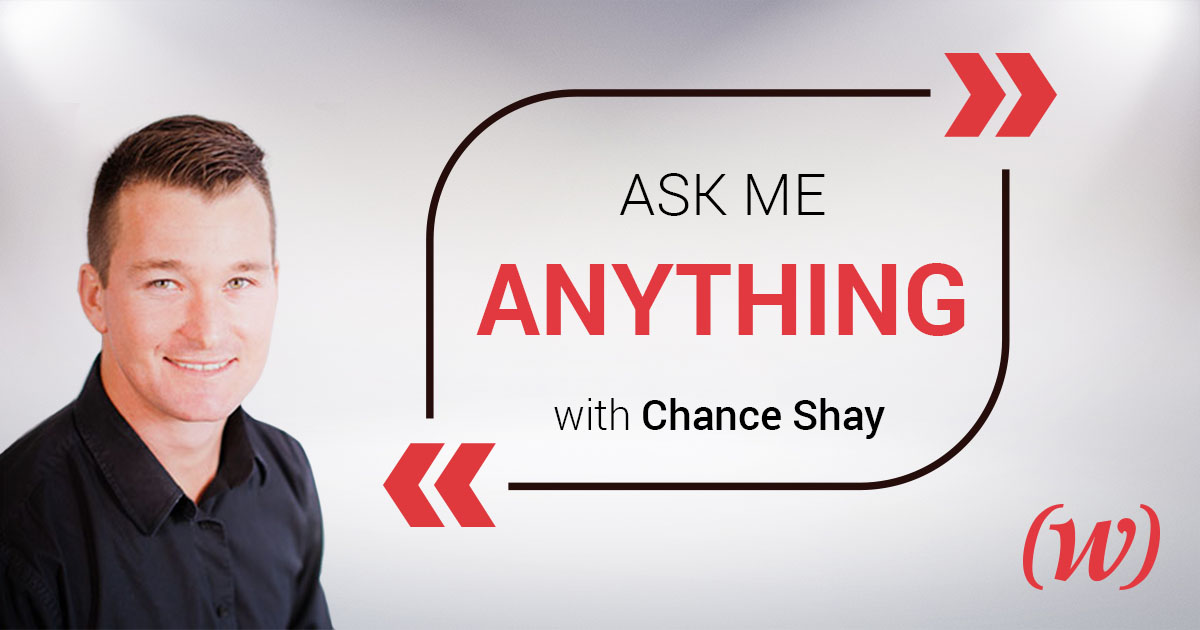The fear of public speaking is real and it’s common. It’s estimated that as much as 75% of the U.S. population (243 million people) fear public speaking. Luckily, with some guidance, coaching and a few public speaking tips; anyone can overcome their fear.
Having led media training and presentation workshops for client partners at (W)right On Communications, I was recently invited to host an AMA on public speaking.
For those unfamiliar, AMA stands for “ask me anything” and is a common online forum format where thought leaders are asked questions about the subject matter they’re expert in. AMAs have become widely popular and have even been used by celebrities to interact and engage with wide audiences. Bill Gates has participated in an AMA to raise awareness about the causes his Foundation champions. Barack Obama was the first sitting president to hold an AMA and he answered questions on everything ranging from economic policy and net neutrality, to money in American politics and the White House’s homebrew recipe. Val Kilmer revealed he had throat cancer during an AMA. Long story short, AMAs are a great venue to get authentic answers to interesting questions.
For the AMA about public speaking tips, I expected a lot of questions about the best way to prepare for speaking in public or techniques for practicing. I was surprised by how many participants asked for tips to overcome their fear. I gave the same answer repeatedly – practice and preparation.
I also received a lot of questions asking for very specific direction or guidance for their individual circumstance. The truth is that every person and every scenario is different. If you’re preparing to speak in front of an audience you’re familiar with about a topic you’re obsessed with, you probably need less preparation to come across as knowledgeable and enthusiastic. If you’re presenting in front of a group of people you’ve never met about a subject you’re less of an expert in, then more preparation would be needed.
Here are some select questions that participants submitted and my responses. Have a different question you want answered? Send it over to us via Twitter, Instagram or Facebook. –Chance
What advice would you give to someone who experiences performance anxiety?
Prepare and practice! The best way to combat performance anxiety is confidence. If you’re confident about your materials and how you’ll deliver them, you’re less likely to be anxious. The amount of preparation should mirror how anxious an individual is/gets. In addition to feeling prepared to deliver the material, the exercise of preparing also forces the individual to confront the anxiety multiple times in advance of the actual scenario. They’ll visualize the scenario, feel the anxiety and be forced to work through it beforethey’re in the moment when it matters.
What tips can you share on what to do if one is giving a speech and suddenly goes blank?
One tip is to ask a question of the audience, if it’s a natural place for it. Hopefully, if the audience has been following along, their question will guide you back on the direction you were originally going.
Another tip is to revisit the points you’ve already made. While this buys time it also provides an opportunity for the speaker to catch back up with their train of thought. While being repetitive isn’t necessarily ideal for a speaker, it can help hammer home key points and give the individual an opportunity to recover.
Option C is to carry a few note cards with 3-4 words to remind you of the key points you want to make.
How can visualization help someone overcome stage fright?
Humans are naturally scared of the unknown. Think about blind dates or visiting a new place. There’s a certain level of anxiety with both. Visualization helps an individual feel more comfortable by anticipating a positive outcome. Visualization also helps the individual to confront nervousness or anxiety in advance of the actual scenario. Once you’ve gotten through that feeling, the nervousness during your speech is likely to be manageable. It’s also like a roller coaster. You might be nervous before your first time riding one, but the second, third, fourth, etc. time are a lot less nerve racking.
Of course, visualization can be a double-edged sword in that if the actual experience doesn’t mirror what the individual visualized, that could create more anxiety. I recommend visualizing but also thinking through alternate scenarios and prepare for how you’d react to the unexpected—like a A/V failure, microphone feedback or empty seats. Don’t be too rigid to where you’re completely thrown off if the reality doesn’t match the expectation. Visiting the venue in advance, arriving early and doing a soundcheck can all also help prevent the unexpected and reduce nerves.
How do you help people overcome their fears and issues about public speaking? What is your method?
It’s a process. Generally, we follow these steps.
- Openly discuss past public speaking situations, their experiences and the nerves or anxiety they faced.
- Have the individual do a mock speech or presentation with just one or two individuals and a camera.
- Conduct a public speaking workshop on the theory behind effective public speaking, tactics and methodologies, common mistakes, and provide some case examples.
- Review the video from the individual’s recorded mock speech and go over the issues or errors and talk through what caused them, review potential tactics to avoid them in the future and reference back to the theory and methodology that had been discussed in the workshop.
- Strategize on the individual’s preparation going forward with a focus on addressing whatever issues that individual is most prone to.
- Let the individual go away (for a few days or weeks, depending on timing) to digest the information provided and implement the preparation plan. Here they’ll practice their upcoming speech.
- Having digested and prepared, have the individual come back and go through the mock speech exercise again. Usually, here we will point out all the improvements they’ve made to bolster confidence and do some slight tweaking to help with any areas still needing improvement.
- Send them on their way to finalize preparation and watch them crush their next speech!
What are the cognitive reasons related to the fear of speaking in public?
Whoa, we can get deep here, but a lot of it would be speculating as everyone is so different.
Broadly, fear of public speaking is due to their person’s current mental condition and past experiences. An individual’s perception is a manifestation of their background and experiences. Many individuals who fear public speaking have had a bad public speaking experience, or, at least, they haven’t had a good public speaking experience. I’ve seen people who had a paralyzing fear of public speaking almost completely shake it once they’ve gone through the preparation process and then nailed their actual presentation. In many ways, it boils down to not believing in themselves in the first place. Once they’ve shown they can do it, they have the confidence and the tools to be more successful going forward and it relieves a lot of the fear.
Do you offer consultations only to CEO’s and entrepreneurs? Where can people contact you?
We do! In fact, it’s a core competency at my agency, (W)right On Communications, Inc. Whether helping CEOs be more effective internal communicators and leaders or helping arm entrepreneurs with the chops to land the funding they’re needing, our program prepares and empowers participants to use speech in a more impactful way. Check out our website wrightoncomm.com and you can shoot me an email at cshay@wrightoncomm.com.
What type of notes should one carry to help during a public speaking engagement?
Ideally, none. The hope would be that a speaker knows their material so well and is so familiar with the content that the speech flows naturally. (This is an important point – that a speech shouldn’t be so rigid that if you don’t say the exact words in the exact cadence you’re thrown off).
The reality is this isn’t that common unless you’re a professional presenter or have had almost endless experiences with public speaking. In this case, if you’re presenting, the slides can be used as your notes. Slides shouldn’t be full of text (and are even better with next to no text), but they can serve as prompts for individual messages you want to convey or stories to share.
If it’s a traditional in-front-of-podium-style speech, then carry a couple note cards with a few words to remind you of the key points they want to make.
How do you manage your fear when facing a public presentation?
This is always the most common question our trainees ask, and the answer is preparation and practice. If you’ve prepared and practiced, you’re naturally less fearful because you’re more confident in your ability to perform. A professional basketball player – who has spent countless hours preparing and practicing – is completely comfortable playing a high stakes game in front of 40,000 people but would be more nervous presenting to a board.
To prepare: decide the points you want to make and what you want your audience knowing/thinking when they leave the speech, develop a storyline to get you to that result, work on that storyline until it suits your communication style, and then practice. Practice aloud to yourself, aloud in front of a mirror, in front of your best friend or significant other, in front of colleagues who are more experienced public speakers, etc.
Having gone through all of that, you’ll be less fearful.
When it’s show time, manage the anxiety by taking deep breaths and speaking slowly.
How often do you recommend practicing before one attempts to give a presentation?
It depends on how comfortable with the material an individual is. If it’s a presentation that a person has given in one form or another a few times before, then 3-5 practice run throughs might be enough.
If it’s a new presentation, the individual is less experienced in public speaking, or the person has a greater fear of public presentations, then that number can go up drastically. For me, I will practice a presentation or speech a few times a day for a week leading up to delivering it. I like to practice in different scenarios – in a familiar place and an unfamiliar place, in a smaller space and in a bigger space, on the treadmill, while walking the dog, etc. One rule is that last-minute practicing can be a recipe for disaster. By putting off practicing until it’s almost go time, an individual doesn’t give themselves enough time to change parts of the presentation that aren’t working, tweak voice inflection and areas for dramatic pauses, or any other changes and stillhave time to practice the re-worked presentation. By beginning your presentation practice early, you have time to decide how much practice is needed.
I’ll also stress that practicing by itself isn’t necessarily effective. If you practice a terrible presentation, the outcome will still be bad. Thorough preparation, including developing your story arc, memorizing your key points, working to cut down fluff and be more concise, etc., is just as important as practicing.
Has picturing people in their underwear or naked ever worked for you?
I can’t think of many things that would be more distracting than visualizing a group of strangers in front of me naked. Mingling and socializing with audience members before a presentation works a lot better for me. It makes me feel like I know them and I’m just talking to some friends.
Have you ever known someone with a severe case of performance anxiety? Is it possible to give a presentation if you have a similar case?
Absolutely. In fact, most of the individuals we work with fall somewhere on the spectrum of performance anxiety. Not only is it possible for these people to give a successful presentation, it’s almost guaranteed if they follow the right strategies for preparing and practicing. Check out some of the other Q&As here for specific tips and processes.
What advice could you offer to a person that paralyzes when talking to a TV camera?
Focus on the person you’re talking to and not the camera. For some, the physical object that is the camera is what throws them off/makes them uncomfortable and for others it’s the idea that there are thousands/millions of people watching through the camera.
By treating the interview like a conversation and focusing on the person you’re talking to, the intimidation of the camera is reduced.
Also, it’s helpful to remember that it’s not just you carrying the burden of the discussion being recorded by the camera. If you’re being interviewed, focus on the key messages and talking points you’ve prepared with, then let the interviewer help carry the load in terms of driving the conversation forward.
What are some of the methods one can use to get over nervousness when giving a speech?
Nervousness is the product of being unsure and lacking confidence about one’s ability to enact the outcome they want. If I was in a situation where I would either double my salary or lose it completely by hitting a target with a bow and arrow, I would be very nervous because I’ve never shot a bow and arrow. But if I was an experienced archer, I’d wouldn’t be very nervous at all, right?
The method to get over nervousness is to prepare and practice! Preparation and practice will make you more confident that you’re going to get the outcome you want – or, sometimes more importantly, avoid the outcomes you least want. Preparation and practice not only improves confidence, but also forces the individual to confront the nervousness in advance of the actual scenario. By experiencing that nervousness over and over again, the situation becomes less daunting and you’re less nervous.
You can check out other Q&As for a more specific process we typically follow for public speaking training.
Sometimes people use medication to calm themselves. Is this advisable? What are your reasons for saying so?
What I typically advise is to not introduce new medication specifically for the purpose of helping for a given speech or presentation. If your doctor has prescribed a certain medication and you’ve been using it for a while, then it’s less of a variable because you’re familiar with it and are used to it.
The sticky situation comes when something happens – say a surgery or unexpected injury – and the person is prescribed medication near the time of a speech. The medication is intended to treat something specific, but it can affect them in other ways they didn’t expect.
So, the rule of thumb is don’t take new medication because you think it will help calm your public speaking nerves.
Are there any relaxation or meditation exercises that you find helpful before doing a public presentation?
Generally, I’m a big believer in meditation as a great exercise for the mind. With that said, no amount of meditation can make you deliver an impactful presentation if you haven’t prepared and practiced.
You definitely want to be in a good frame of mind going into a public presentation, so don’t be rushed, try not to get in an argument or be involved in a road rage incident on your way to the venue, get sleep and eat nourishing food. Being rested and prepared are probably the most important factors in being able to perform during go time.
What if someone interrupts you when doing a speech and your audience loses attention? What can you say to make them focus on you if you are terribly shy?
Call them out! If an audience person tries to hijack your presentation, you can’t pretend like you didn’t notice or ignore it. Acknowledge their statement, remind the audience why you’re the expert on the topic they’ve come to listen to and offer to speak after the presentation with the audience member. This will nip it in the bud and discourage others from interrupting you going forward.
Some examples:
Interrupter – “I disagree with what you’re saying. In my experience,….”
Your response – “That’s an interesting observation. In my XX years of experience, I haven’t heard or seen what you describe. Let’s explore that after the presentation. Now, the point I was making is…”
Would you recommend having an alcoholic drink to calm one’s nerves before a presentation? Why or why not?
I’d never advise this to someone. Taking some sort of depressant or stimulant – whether alcohol, pharmaceuticals or otherwise – is a crutch. The best way to create confidence and ensure you’re effective is by methodically preparing and practicing. If you’ve prepared and are well practiced, you’ll be less nervous, but perhaps more excited.
Not to mention, a drink might have unintended consequences that could have a far greater negative effect than the good it does with calming nerves. It might work when approaching someone during a social event where alcohol is being served. But in a professional setting, you don’t want to be buzzed when your audience is sober – especially if they paid to see you!
What types of rituals do you have to do before a presentation? What is the logic behind these rituals?
I start by defining the goals of the presentation – what is the one thing (if it’s a short presentation) or three things (if it’s a longer presentation) I want my audience walking away with. From there, I start to outline content to form a story arc. Once I have that frame, I begin to massage and rework the story to be more effective and concise. Once I have the story developed, I’ll begin working on the physical presentation and visuals. I want the visuals to align with the mood of the presentation and the vibe of the venue/audience.
I’m much more ritualistic with my practice routine. First, I practice by physically reading my script. Saying the words out loud helps me identify what feels uncomfortable and awkward, so that I can rework it. After this, I will go through the presentation with an audience of colleagues who are experienced public speakers for feedback and input. From there, I revise the story and practice the presentation in the bathroom or in front of a mirror, so I can focus on getting my expressions and vocal inflections down. After all of this, I move to an empty conference room or something more spacious – typically speeches are given in bigger, more open venues so this will more closely resemble the actual experience. During this time, I’ll also try to do a walkthrough of the venue if I’m not already familiar with it.
This is maybe two weeks out from the presentation. For the week leading up to the presentation I’ll visualize the presentation and practice delivering the story out loud a few times throughout the day – while walking the dog, driving to the office, on the treadmill.
On the day of, I have my normal amount of caffeine, listen to upbeat music that puts me in a good mood on the drive to the venue, and arrive well in advance of the actual event so that I can get comfortable in the space.
Sometimes when giving a presentation people sweat and use their hands excessively. What should be done to control over gesturing and not perspiring as much?
Gesturing is common and not necessarily bad. Depending on the topic, venue and audience, gesturing is important to keep attention and generate engagement with the audience. For a person that tends to have more distracting gestures, it’s helpful for them to record themselves on video and review the recording with a colleague to identify what’s working and what’s taking away from their message. From there, the individual can do things like no-gesture practicing (trying to remain still while delivering their presentation) to change their behaviors. By over-compensating on the correction, the final result will be something right in the sweet spot, typically.
The sweating thing is a lot different, simply because a lot of it has to do with a person’s genetics. One tip is to wear light clothing to limit the warmth of the body. Trying to keep the body at as low a temperature as possible is helpful. Having water handy and choosing clothing that doesn’t show perspiration are other tips.
How does stage fright manifest itself? Is this a shyness-related problem?
In my experience, introverts and extroverts are just as susceptible to stage fright. The fear is more closely connected to the fear of failure than the fear of interacting with people. If you told a person with stage fright that there was a 100% likelihood she will be successful on stage, she wouldn’t be afraid.
The best way to overcome this is creating confidence that you’ll be successful in the speech/presentation/interview. Success comes from practice and preparation, which we discuss in-depth in other Q&As in this thread. Check them out!







 Grant Wright
Grant Wright




 Corie Fiebiger
Corie Fiebiger
 Shae Geary
Shae Geary Roman Lukjanenko
Roman Lukjanenko Phelan Riessen
Phelan Riessen Katrina Early
Katrina Early Hamish Marshall
Hamish Marshall